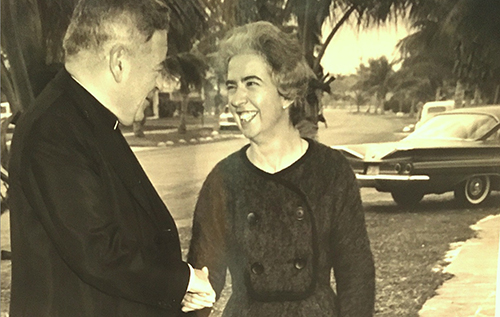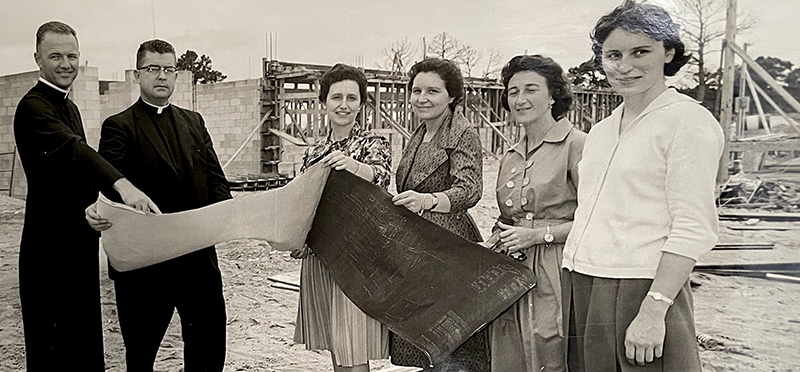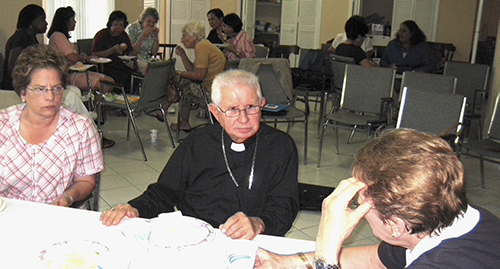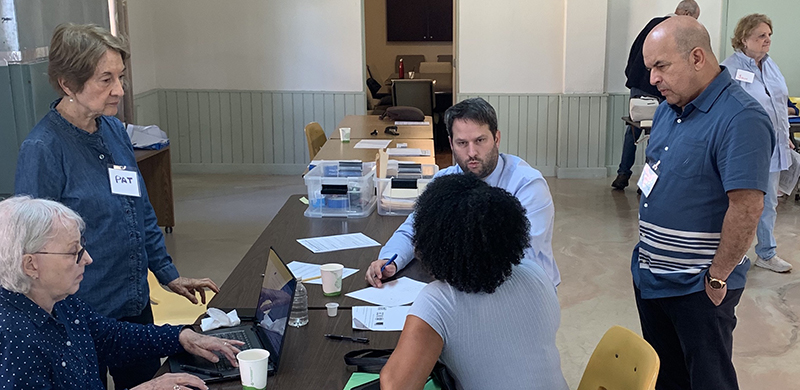By Ana Rodriguez Soto - The Archdiocese of Miami

Photographer: COURTESY
In this 1961 photo, Maria Teresa Barrenechea, international vice president of the Teresian Association, greets Bishop Coleman F. Carroll. That year, Bishop Carroll established a house for Teresian members in Coral Gables.
MIAMI | Long before the Second Vatican Council extolled the role of the laity, a diocesan priest in Spain created an association of lay people committed to spreading the Gospel from within the secular society by uniting prayer and study, formation and action.
The group, known as the Teresian Association (TA) and present in Miami since the early days of the diocese, is now concluding the centenary of its Pontifical Approval by Pope Pius XI in 1924, which allowed the association to expand outside of Spain and currently to 30 countries. Its centenary motto: “1 year to celebrate 100 years.”
The first members who arrived in Miami were young women, some of whom still remain in the diocese. Bishop Coleman Carroll was starting a new diocese and needed bilingual personnel in the face of the arrival of thousands of Cubans fleeing the political changes on the island.
“We came to Miami in 1961 at the invitation of Bishop Coleman F. Carroll who entrusted us with the education of the girls division at Msgr. Edward Pace High School,” recalled Rosemarie Kamke, one of the first group of teachers.

Photographer: COURTESY
In this 1961 photo, at the construction site of Monsignor Edward Pace High School in Miami Gardens, from left, Fr. Luis Roberts, principal of the school; Msgr. William McKeever, superintendent of schools for the archdiocese; some members of the Teresian Institution; and far right, Rosemarie Kamke, former principal of Immaculata-La Salle School in Miami.
Other TA members were entrusted with the pastoral care of Newman Centers at the University of Miami and the community colleges of Miami and Palm Beach, since the Diocese of Miami at the time covered the 16 southernmost counties of Florida.
With a doctorate in education, Kamke later served as principal of Immaculata-La Salle High School for 12 years. Today, she is part of a TA team in the Diocese of Holguín, Cuba, where, since 2010, members collaborate in the formation of the laity, teaching theology courses, training Catholic communicators, and creating and directing a social center and managing the diocesan library.
In the 1960s, Regina Cameron was a student at Msgr. Edward Pace High.
“The dedication and enthusiasm of the teachers intrigued me,” she said. She joined the group, and after her college graduation, worked for nine years at St. Francis of Assisi K-8 school in Riviera Beach, then entrusted to the Teresian Association.
After obtaining a master's degree, she spent 34 years teaching and as assistant principal in Broward County public high schools. “The charism of the TA has always supported my professional life and for that I will be eternally grateful,” Cameron said.
Teresian Association members have been involved in many other activities throughout their 63 years in the Archdiocese of MIami. In addition to holding leadership positions at Msgr. Pace and Immaculata-La Salle, TA members have served as principals at St. Francis of Assisi in Riviera Beach, Our Lady of Perpetual Help in Opa-Locka and St. Helen in Fort Lauderdale. They have taught at St. Vincent de Paul Regional Seminary in Boynton Beach and been part of the archdiocesan departments of Religious Education, Migrant Ministry, Campus Ministry and The Voice-La Voz Católica. Others work in the public school system and in other professions.
During the 1970s and 1980s, when Hispanic integration into the life of the North American Church was advancing via a process of national “Encuentros,” several TA members participated in the work of the Miami-based Southeast Pastoral Institute for Hispanics, better known as SEPI, and held leadership positions in the National Catholic Council for Hispanic Ministry, which brings together all Catholic organizations that work with Hispanics.

Photographer: COURTESY
In this 2010 photo, Bishop Agustín Román, Auxiliary Bishop of Miami, speaks with members of the Teresian Association at the Poveda Center in Miami.
In 1977, Miami's second archbishop, Edward McCarthy, wanted to start a program of lay ministries. In the garage of the TA house in Coral Gables, built by Archbishop Carroll for the association, Dr. Mercedes Scopetta and members of the TA began contacting parishes to start the program.
Toni Miranda collaborated in the program along with other TA members she had met in the early ‘70s, when she worked at the Office of Bilingual Education in Miami-Dade County's public schools. Born in Camagüey, Cuba, Miranda came very young to the U.S. and has been able to return as part of the team that works with educators in the Diocese of Holguín.
In the ‘90s, TA members in Miami created the program “The Inner Journey,” which was offered in dozens of parishes to initiate lay people into a journey of prayer based on the teachings of St. Teresa of Avila in “The Interior Castle.”
During that same decade the TA also created and endowed the Josefa Segovia Scholarship Fund, still active, to raise funds and offer scholarships for youth unable to pay for tuition at Catholic schools.
With a new century in sight, the TA began the program “Laity 2000: Human, Free, Holy,” to help lay people integrate faith into daily life by developing materials for reflection groups with themes about family, Church, work, and society.
The Poveda Center in southwest Miami has been the locus of the TA's socio-educational project, which brings together education professionals under the pedagogical guidelines of the association's priest-founder, now St. Pedro Poveda. The motto for their work: “To Educate in Difficult Times.”

Photographer: COURTESY
Members of the Teresian Association partner with Catholic Legal Services in the Immigrant Outreach Project at Corpus Christi Parish in Miami. From left, seated, Teresa Casal, Patricia Stockton, attorney Joe Cano and Orlando Marquez of Catholic Legal Services listen to an immigrant's case.
Pedro Alcocer joined those groups after meeting Ela Alvarado, a professor at Nova University, while studying for his master's degree. Alvarado invited him to the Poveda Center, where he said he found “a united group that cared about others and a religious environment, which I shared.” He remains in the group “because there is a lot to do in the community. It helps me not to let my guard down.”
Alvarado is from Santa Clara and now also works in the Diocese of Holguín. In Miami she met up with Pepe Varela, a member of her youth group in Cuba, and spoke to him about St. Pedro Poveda.
“I loved his message,” said Varela, especially his words referring to Jesus: “That I may think what you want me to think, that I may want what you want me to want, that I may feel how you want me to feel, that I may act as you want me to act, that is my only aspiration.”
Together with his wife, Thania Céspedes, and eight other people, Varela made the commitment to live the lifestyle that St. Pedro Poveda proposes to TA members: to live like the first Christians, to imitate the humanism of St. Teresa of Avila and her prayerful nature, and to work quietly, being salt that gives flavor to life, and being light that illuminates and transforms with the values of the Gospel.
Today, at the Poveda Center, men and women receive support and formation through meetings, conferences and retreats. In recent years, projects include a Laudato Sí club, Cine Encuentro, sending medicines to Cuba and Venezuela, and collaborating in projects such as the one at Corpus Christi Parish in Miami where, with the support of Catholic Legal Services, immigrants receive help in applying for legal residence in the U.S.
To close out the centenary activities that have taken place at the Poveda Center during the year, Archbishop Thomas Wenski will preside at a Mass of thanksgiving Saturday, Jan. 11 at 10 a.m. at Corpus Christi Parish in Miami.
Ana Rodriguez-Soto is former editor of the Florida Catholic Miami edition and executive editor of La Voz Católica. She met many Teresian Association members while studying at Msgr. Edward Pace High School.
FIND OUT MORE
- The Teresian Association is an international association of lay people started in 1911 by the diocesan priest Pedro Poveda in Covadonga, Spain, who, before Vatican II, supported the call of the laity to holiness and to play an active role in the evangelizing task of the Church in society, uniting prayer and study, formation and action.
- To become a TA associate, people follow a formation process and decide on their personal vocation within one of the TA associations.
- For information about the TA email: [email protected].
- Or go to:
- https://www.itweareopen.com/en
- www.pedropoveda.org/en
- www.poveda-it.org
- https://institucionteresiana.org/en/

Photographer: COURTESY
Members of the Teresian Association at a meeting held in 2023 at the Poveda Center in Miami.

